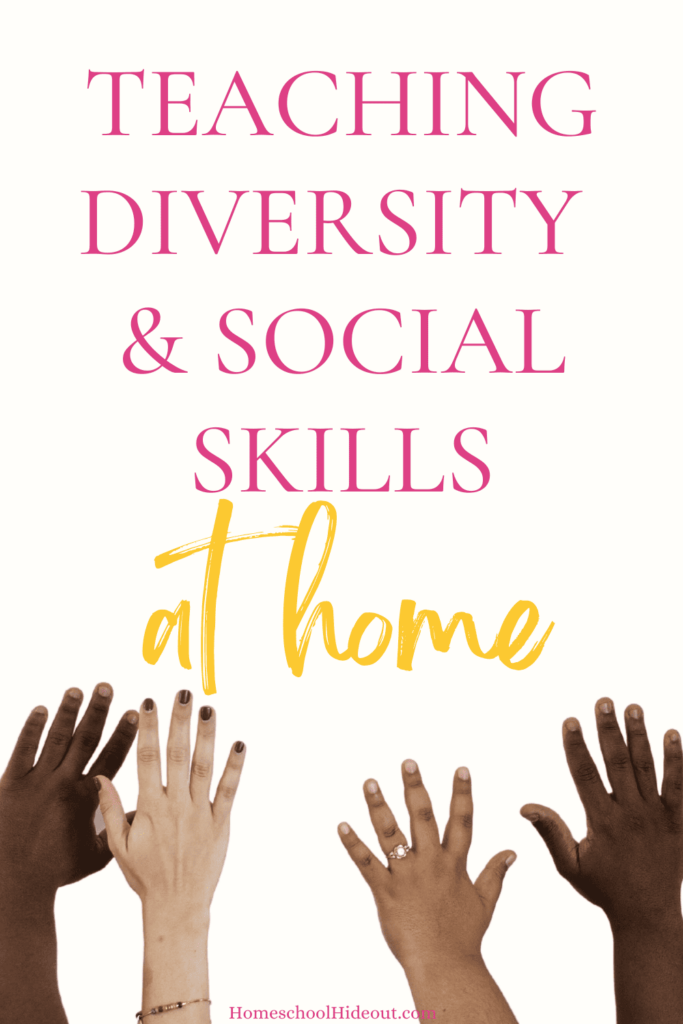In today’s interconnected world, fostering cultural connections and teaching diversity to kids has become increasingly important. According to a blog post by Children’s Mercy, diversity and inclusion play a crucial role in fostering empathy among children by exposing them to individuals who have different backgrounds and experiences. This exposure enables children to develop a deep understanding and appreciation for diverse perspectives.
As homeschooling parents, we have a unique opportunity to instill a strong appreciation for different cultures and promote social skills within the comfort of our own homes. By integrating diverse perspectives into our curriculum and incorporating intentional activities, we can nurture our children’s understanding and acceptance of cultural diversity.
In this article, we will explore practical strategies and resources to help homeschooling families teach diversity and social skills effectively.
Why Social Skills Matter
When it comes to homeschooled children, the importance of social skills cannot be underestimated. Social skills for kids play a crucial role in various aspects of their life, even outside traditional school settings. Homeschooled kids with well-developed social skills benefit academically, emotionally, and in their future endeavors.
The Coalition for Responsible Home Education emphasizes that homeschooled children, just like their peers in traditional schooling, require the development of “social fluency.” This entails equipping them with the skills to navigate diverse social situations, foster meaningful relationships, and effectively collaborate with others in various settings.
According to Friendzy, these skills contribute to better engagement and positive behavior, which enhances their overall learning experience. Social skills are particularly important for homeschooled children as they actively engage with a diverse range of social situations beyond the traditional classroom environment.
Embracing Cultural Awareness
Embracing cultural awareness involves cultivating an understanding and appreciation for different cultures. Start by introducing your children to diverse literature, films, and music that celebrate various backgrounds. Explore multicultural festivals, traditions, and cuisines together. Engage in open conversations about diversity, addressing stereotypes and promoting inclusivity.
Exploring Global Traditions
As highlighted in a blog post from the Oxford University Press, multiple cultural factors significantly impact children’s school experiences and academic performance. These factors encompass parental beliefs, socialization practices, and cultural perspectives.
Encourage your children to explore global traditions through hands-on activities. Create a “Culture of the Week” project where you dive deep into a specific country or region. Engage in crafts, cooking, and games that reflect that culture. Explore traditional clothing, holidays, and customs, allowing your children to gain a deeper understanding of different ways of life.
Virtual Cultural Exchanges
Take advantage of technology to connect with diverse communities worldwide. Seek virtual cultural exchange programs or pen pal initiatives that facilitate conversations between children from different backgrounds. Engaging in online discussions and sharing experiences can broaden their horizons and develop empathy toward others.
Parents can explore various online platforms and organizations that facilitate virtual cultural exchanges, ensuring a safe and enriching experience for their homeschooled children. By embracing virtual cultural exchanges, we empower our children to become global citizens who appreciate and celebrate diversity while fostering meaningful connections that transcend geographical boundaries.
Role-playing and Perspective-taking
Role-playing activities can help children understand different perspectives and enhance their social skills. Encourage them to step into the shoes of someone from a different culture or background. This immersive experience can foster empathy, improve communication, and teach conflict resolution skills.
Community Involvement
Engaging with your local community provides opportunities for cultural learning and social interaction. Attend cultural events, join community organizations, or volunteer with diverse groups. By actively participating, your children can broaden their understanding of cultures and develop meaningful relationships.
Cultivating Inclusive Language
Language plays a crucial role in promoting inclusivity and social skills. Teach your children to use inclusive language that respects diverse identities and backgrounds. Encourage children to be courteous when they ask questions and to engage in active listening when engaging with individuals from other cultures. Emphasize the importance of empathy, kindness, and open-mindedness in all their social interactions.
Final Thoughts
Homeschooling provides a unique opportunity for parents to nurture their children’s social and cultural understanding. By intentionally embracing cultural awareness, engaging in activities that explore diverse cultures, and participating in online interactions, parents can help cultivate their children’s genuine appreciation for different cultures and foster empathy.
These activities not only expand their knowledge but also promote a deeper understanding of others. This contributes to the development of well-rounded individuals. Engaging in role-playing exercises and actively involving themselves in the community further enhances their social skills and broadens their perspectives.
Through teaching inclusive language and fostering empathy, kindness, and open-mindedness, homeschooling parents can guide their children to become global citizens who celebrate diversity, navigate social interactions with ease, and form meaningful connections that transcend boundaries.







